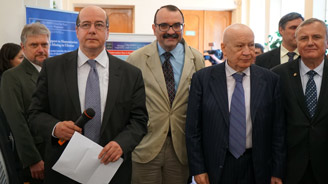NATO and Ukraine take stock of successful scientific cooperation
Scientists, experts and policy makers from Ukraine, the region and NATO member states gathered for the Science for Peace and Security (SPS) Programme Information Day 2016 in Kyiv, Ukraine on 27 May. The event provided an opportunity for the dissemination of the tangible results achieved through practical cooperation and the implementation of SPS projects in Ukraine.

The SPS Information Day, organised jointly with the Ministry of Science and Education of Ukraine, the National Academy of Sciences of Ukraine and the Mission of Ukraine to NATO, allowed participants to learn more about the work of the SPS Programme, to develop new initiatives for practical cooperation, and to create networks of experts to address security-related civil science and technology issues.
The event attracted more than 200 interested scientists and experts who shared their experience of the SPS Programme and talked about their projects that address mainly the defence against chemical, biological, radiological and nuclear (CBRN) weapons and security-related advanced technologies. The funds, training and equipment provided by the SPS Programme benefit not only the Ukrainian scientific community but also local populations. “The SPS Information Day sends a strong message of NATO support to Ukraine,” emphasised Dr Maxim Strikha, Deputy Minister of Science and Education of Ukraine.
After a lively panel on the political importance of international scientific cooperation and SPS activities with Ukraine, Ambassador Sorin Ducaru, NATO Assistant Secretary General for Emerging Security Challenges, opened an exhibition that showcased the fruitful research and concrete results of 24 SPS projects with Ukraine. Over 80 SPS project directors and young scientists displayed their research on posters and handouts, but also by showcasing samples, simulations, and models that they have produced in their SPS projects.
“Not only the number of SPS projects matter, but the quality of these projects,” commented Ambassador Ducaru. “By bringing together high-level scientists, collaboration through the SPS Programme benefits not only Ukraine, but the global scientific community. SPS collaboration creates important networks and synergies, while producing practical results. This exhibition is a proof of the progress being achieved in a wide range of activities.”
Intensified scientific cooperation
Active engagement between NATO and Ukraine dates back to 1991 and has been deepening ever since. In response to the crisis in Ukraine and following the political guidance provided by NATO foreign ministers in April 2014, practical cooperation with Ukraine in the field of science and technology has been further enhanced.

From left to right: Ambassador Sorin Ducaru, Dr Maxim Strikha, Mr Volodymyr Horbulin (First Vice-President of the National Academy of Sciences of Ukraine) and Prof. Anatoliy Zagorodniy (Vice-President of the National Academy of Sciences of Ukraine)
Today, Ukraine is the largest beneficiary of the SPS Programme. Since 2014, 49 SPS activities with Ukraine have been launched. These include 40 Multi-year Research Projects, 7 Advanced Research Workshops and 2 Advanced Training Courses. More than 600 international scientists and experts are involved in 35 ongoing multi-year projects. Within the scope of these projects, more than 250 young scientists, many of them Ukrainian, received the opportunity to pursue research in their field of interest, together with their counterparts in NATO countries. Moreover, among these scientists, the SPS Programme provided financial support in the form of stipends to over 100 young scientists to kick-start their academic careers.
For its yearly meeting, the NATO-Ukraine Joint Working Group on Scientific and Environmental Cooperation (JWGSEC) met at NATO HQ in Brussels in September 2015 to take stock of SPS activities in Ukraine. The high-level Ukrainian delegation that was led by Dr Maxim Strikha, provided an overview of the significant impact of the current security crisis in Ukraine on the scientific infrastructure and education institutes in the country. In this regard, the SPS Programme plays an important role by engaging Allied and Ukrainian scientists and experts in meaningful, practical cooperation, forging networks and supporting capacity-building in the country.
